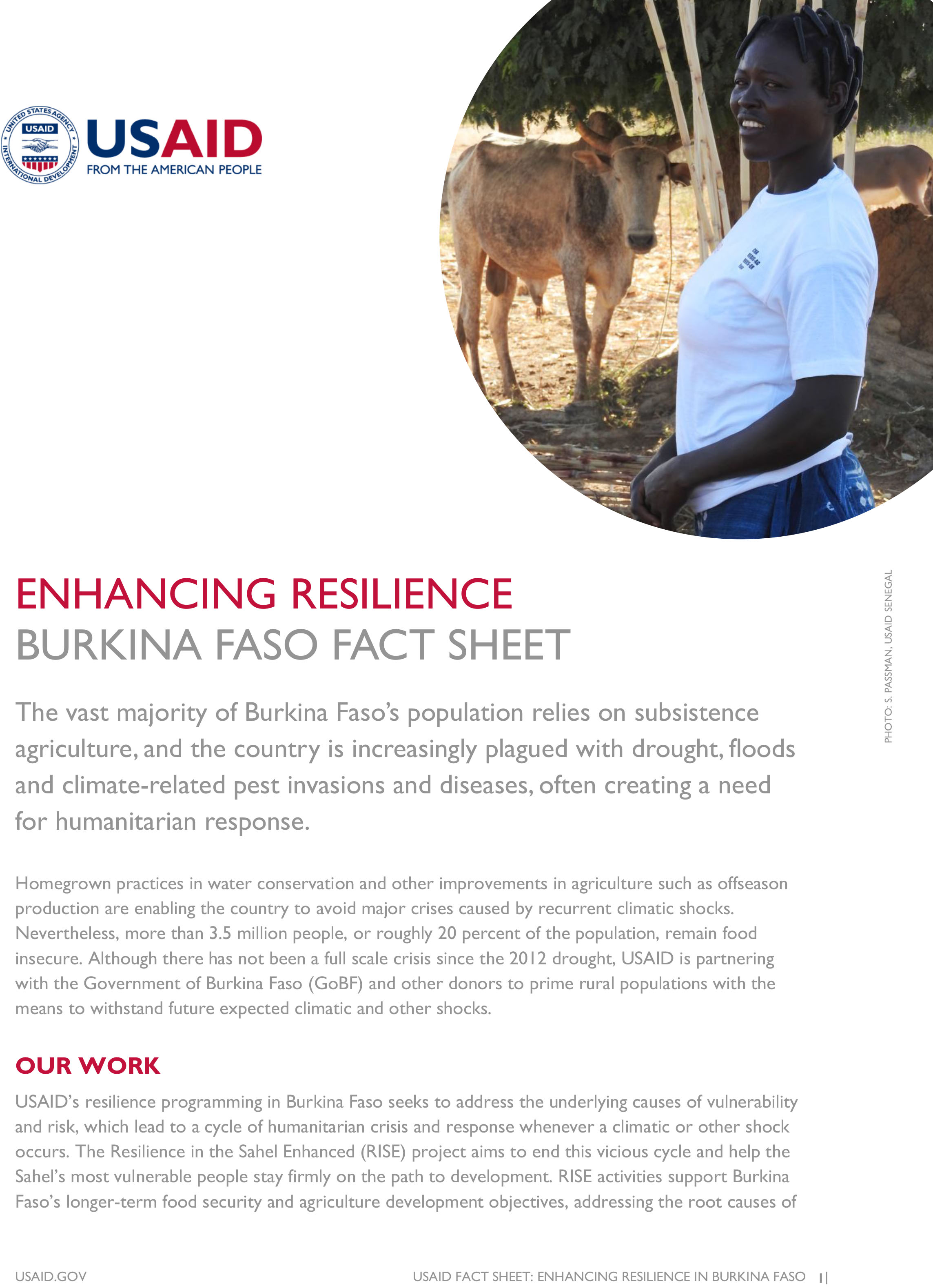Speeches Shim
The vast majority of Burkina Faso’s population relies on subsistence agriculture, and the country is increasingly plagued with drought, floods and climate-related pest invasions and diseases, often creating a need for humanitarian response.
Homegrown practices in water conservation and other improvements in agriculture such as offseason production are enabling the country to avoid major crises caused by recurrent climatic shocks. Nevertheless, more than 3.5 million people, or roughly 20 percent of the population, remain food insecure. Although there has not been a full scale crisis since the 2012 drought, USAID is partnering with the Government of Burkina Faso (GoBF) and other donors to prime rural populations with the means to withstand future expected climatic and other shocks.
PROGRAMS
USAID’s resilience programming in Burkina Faso seeks to address the underlying causes of vulnerability and risk, which lead to a cycle of humanitarian crisis and response whenever a climatic or other shock occurs. The Resilience in the Sahel Enhanced (RISE) project aims to end this vicious cycle and help the Sahel’s most vulnerable people stay firmly on the path to development. RISE activities support Burkina Faso’s longer-term food security and agriculture development objectives, addressing the root causes of persistent vulnerability. These multi-year, multi-sectoral projects increase sustainable economic well-being through increased agricultural productivity, income diversification and increased access to markets and financial services.
Burkina Faso Fact Sheet-Enhancing Resilience ![]() (pdf - 267k)
(pdf - 267k)
RISE also seeks to improve health and nutrition while also strengthening institutions and governance critical to resilience in order to improve natural resource management and mitigation of resource-related conflict. Activities under RISE are implemented through an approach aiming to expand institutional, household and individual capacity to adapt to and recover from stresses, and improve nutrition, health and well-being of vulnerable populations. Finally, USAID complements RISE by working with the GoBF as it begins implementation of its Country Resilience Priorities under the Global Alliance for Resilience Initiative. The GOBF is working with the donor community to improve its people’s resilience by incorporating these resilience priorities into its second five-year National Agricultural Investment Program. Finally, USAID supports a learning project that helps bring all of these efforts together by evaluating the impact of RISE projects; promoting collaboration across government, donors and programs; and facilitating learning in order to better guide resilience interventions in the Sahel.USAID’s resilience programming in Burkina Faso seeks to address the underlying causes of vulnerability and risk, which lead to a cycle of humanitarian crisis and response whenever a climatic or other shock occurs. The Resilience in the Sahel Enhanced (RISE) project aims to end this vicious cycle and help the Sahel’s most vulnerable people stay firmly on the path to development. RISE activities support Burkina Faso’s longer-term food security and agriculture development objectives, addressing the root causes of persistent vulnerability. These multi-year, multi-sectoral projects increase sustainable economic well-being through increased agricultural productivity, income diversification and increased access to markets and financial services.
- Reduced malnutrition in targeted areas
- Reduced vulnerability and need for humanitarian assistance
- Reduced food insecurity through increased food availability and improved livelihoods
- Improved productivity in agriculture sector and livestock industries
- Increased representation of women in food and nutrition activities at community level



Comment
Make a general inquiry or suggest an improvement.